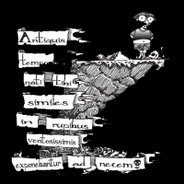The Pantheon of Super-Heroes, Part Two
 One of the trickiest thing to balance in a super-hero comic book is keeping your character toeing the fine line between being mythic and being human.
One of the trickiest thing to balance in a super-hero comic book is keeping your character toeing the fine line between being mythic and being human.
Super-heroes, in many ways, are just the next evolutionary step in a long chain of mythic creations, after all. They are what our society has given us as an answer to our lives and times, just as Homer's Odysseus and his adventures were what were needed in ancient Greece.
Odysseus is a wonderful example of a super-hero from ages past, in that he carried on with many adventures, some of them rather extreme and difficult to believe. He was mythic in the same way that Hercules was, and in very much the same way that Iron Man's Tony Stark is today. (After all, Odysseus had something of a penchant for wine, women, and song; there is one piece in, if I recall properly, the Illiad when Odysseus finds his crew imprisoned by a beautiful woman. So he lives with her and drinks her wine and eats her food and has lots of sex with her for a year before he finally sets his crew free. That has Tony Stark written all over it.)
The mythic is important, one of the most important things to inspire when creating your hero. Superman always worked best when he was slightly inhuman, when he possessed an iron will and a clear sense of right and wrong. Superman was very much the sort of classic hero that we see discussed in the wonderful book Hero With A Thousand Faces by Joseph Campbell, one of the great science fiction writers of our time. Inversely, Superman is at his poorest when mostly, he just Has Angst and is unsure of himself, and does nothing mythic.
We want to know that there is a man behind the curtain, but we just want Oz, great and terrible.
Moments of humanity are good and powerful things. Jesus was another mythic figure (I'm not saying he was a myth, I'm saying he was mythic, please put down the angry e-mail), but there were moments of weakness there. They were important because of how starkly they contrasted with the rest of his character. The moment when he drives the merchants out of the temple with a whip, or the moment when he is terrified in Gethsemane, praying that he won't have to do what he knew he did.
If, on the other hand, Jesus spent all of his time agonizing, then there's nothing special about Gethsemane. If he spends all of his time raging against merchants, then driving some out of a temple is nothing very special.
It's the same with most super-heroes. Captain America or Superman are good examples. So is Batman, so is Hal Jordan. Actually, I think most of the Silver Age and Golden Age of super heroes are good examples. Even someone like Captain America, who was human where Superman was not, still was inhuman in his beliefs and his iron will.
Spider-Man is an example where the humanity is more important than the mythic. With Captain America, this is a great and towering figure striding across a scene. With Spider-Man, he is at his best when you are very aware that there is a man behind the mask. With Spider-Man, he can be fighting Norman Osborne, and you can still know that when he's done, he may have to grab his camera and go to his job, to pay his bills. This is humanity and Spider-Man works powerfully because of it, but on completely different levels than someone like Superman works.
The X-Men are another example. They are fatally flawed individuals (who is more chronically messed up than Cyclops, after all?) And yet, in their greatest stories and most powerful moments, the X-Men too become something mythic and greater than mere humanity. When you get into the classic Chris Claremont/Steve Ditko storylines which gave us such stunning stories as The Phoenix Saga, even though the dialog is over the top (and RIFE with EXCLAMATION POINTS!!!!) and even though the character motivations are clearly detailed in little bubbles, these are as mythic as Odysseus or Paris or Heracles standing on a battlefield and vaunting over their fallen enemies.
So if we treat Spider-Man as one extreme (Humanity) and we treat Captain America as another extreme (Mythic) then you can see where the importance is to not only toe the line between the two and be willing to cross over...but the most important thing is to be totally aware of it.
As I mentioned in a previous post, I re-read a number of comics from the Nineties, and while they were still showing hints and signs of the mythic qualities of yesteryear, they were beginning to experience one of the fatal problems that would really hurt comics as time went on (bankrupted companies, among other reasons).
They were embarrassed of themselves.
Superman works when he stands up tall and proud with his cape flapping in the wind and the American flag waving behind him, his chest out, his hands on his hips. He shouldn't be slightly hunched, because he's embarrassed about wearing tights and a bright red cape in public. Just a metaphor, but you see what I mean. Comics were suddenly going "yeah, but..." and it hurt them. The Phoenix Saga wouldn't have worked, for example, without the vim and vigor and passion that was thrown into it. It was something of a ridiculous storyline, but it took itself seriously, and thus you are hard-pressed not to do likewise.
Comics were suddenly going "yeah, but..." and it hurt them. The Phoenix Saga wouldn't have worked, for example, without the vim and vigor and passion that was thrown into it. It was something of a ridiculous storyline, but it took itself seriously, and thus you are hard-pressed not to do likewise.
Comics, thankfully, are getting better at this. It doesn't hurt that we have writers like Joe Straczynski and Peter David and Joss Whedon working on comics. They know what they're doing.
Comics need to know where they stand. They are mythic, or they are human, and then they foray into the other side for great effect. Trying to muddle around in both -- either on purpose, or without realizing at all that that's what you're doing -- results in poor comics that lack momentum, passion, and characters you can really care about.
Super-Heroes are most assuredly a pantheon, just like the Greek gods were, just like the Roman gods were (though they evolved from the Greek pantheon) and especially like the Norse pantheon of gods. Any pantheon of gods and heroes and immortals and giants and great epic stories are the ancestors of the modern super-hero story.
It's worthwhile to remember that.




No comments:
Post a Comment